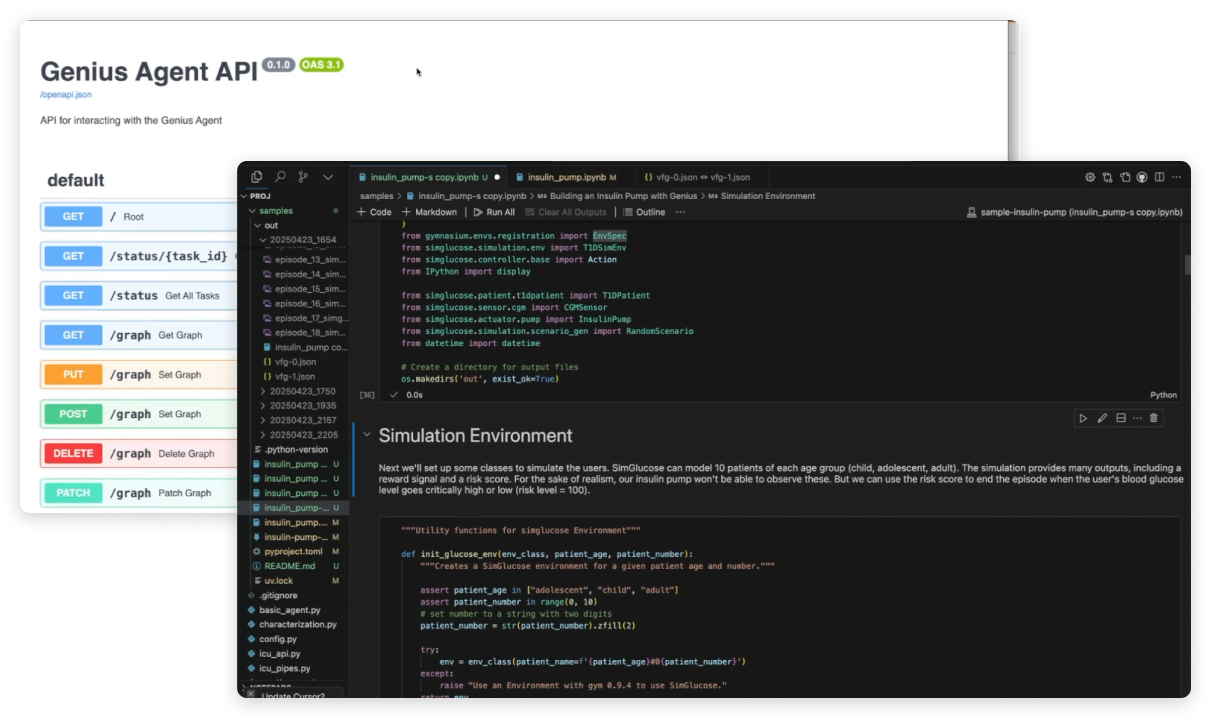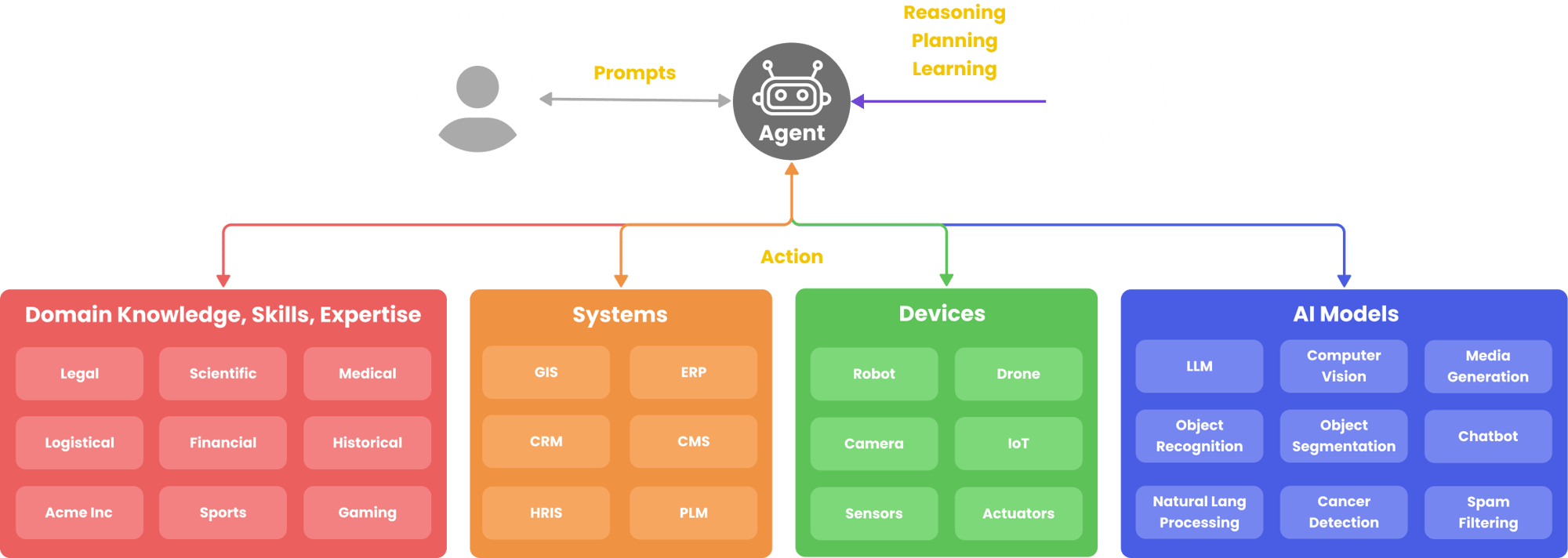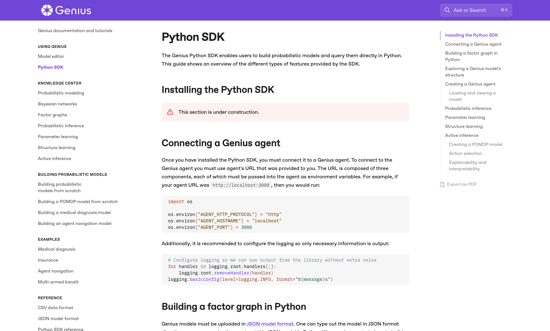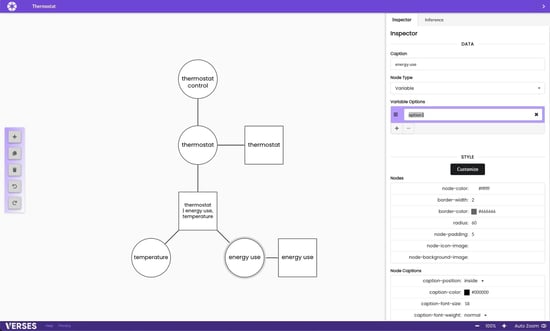Modeling & Validation Tooling
Intuitive low-code user interface for modeling and structuring cause and effect in data.

More Reliable Predictions and Smarter Decisions for Business.
Gartner predicts 50% of AI models will be domain-specific* by 2027 yet today’s general purpose AI models fail to reliably solve domain-specific problems.
Genius is a cutting edge agentic enterprise intelligence platform for rapidly building reliable domain-specific predictions and decisions and is particularly useful for problems that involve volatility, uncertainty, complexity or ambiguity.
Genius is designed from the ground up to accelerate time-to-value for machine learning researchers, engineers and data scientists working on enterprise-class challenges.
Genius is designed to help machine learning professionals and data scientists
"50% of AI models will be domain-specific"
Gartner
Genius Features

An intuitive no-code graphical user interface designed to help you model the causal relationships between factors and variables.
*Bayes Nets only

User guidance to help you build models and run inference fast.

Upload CSV datasets to extract variables, factors and parameters and export as JSON to perform inference.

Train, measure and update explainable models continuously

Quantify uncertainty and express probabilistic predictions of likely outcomes.

Group and categorize data in order to simplify analysis and optimize inference.

Troubleshoot and debug errors, build resilient models and recover faster for a smoother development experience.
Genius Capabilities

Intuitive low-code user interface designed for modeling domain-specific causal models on which to perform reasoning, planning and learning using Active Inference.

Advanced reasoning and planning using Bayesian inference mechanisms.
Customer Success
Intuitive low-code user interface designed for modeling domain-specific causal models on which to perform reasoning, planning and learning using Active Inference.

Advanced reasoning and planning using Bayesian inference mechanisms.


Simplified deployment, tutorials and reference examples.

Manage users, licenses, agents and support tickets.

Well-documented SDK and APIs along with customer success support.
Simplified deployment, tutorials and reference examples.

Manage users, licenses, agents and support tickets.

Well-documented SDK and APIs along with customer success support.

Modeling & Validation Tooling
Intuitive low-code user interface for modeling and structuring cause and effect in data.
Performance Characterization
Command tool for monitoring model and inference performance in real time.
Enhanced Inference and Learning
Advanced Reasoning and planning using Bayesian inference mechanisms.
Lifecycle User Enablement
Simplified deployment, tutorials and examples for enabling users get time to value.
Easy to Install & Use
Kubernetes containers for easy deployments.
Analytics & Telemetry
Monitor user activity to enable data-driven decision-making.
Intelligence Powered by Genius
Agents powered by Genius have agency and autonomy can act as the intelligent interface to knowledge repositories, systems, devices, other AI and ML models and even other agents.

Unlimited Potential
Hallucinations
Drift
Static models
Sample inefficiency
Sensitivity to noise
Black box
Hardware inflexibility
Lack of uncertainty quantification
Goodbye
bots, pre-training, black box, fragile, oceans of data, energy intensive, tedious rework
Hello
agents, continual learning, explainable, flexible, sample efficiency, sustainable, rapid prototyping
Instant Insight


Adaptable
Continual and online learning
Autonomous
Self-directed goal setting & decision making
Composable
Modular and reusable knowledge models
Efficient
Requires few samples and minimal compute
Explainable
Transparency into how predictions and decisions are made
Flexible
Powerful specialized GPUs are not required but optional
Interoperable
Shared knowledge means better decision making
Reliable
Predictions have confidence score qualifiers
Resilient
Fault tolerance and able to recover from failure
Scalable
Run in the cloud or at the edge
Sustainable
Less compute and less retraining means less energy
Quantify Uncertainty
Thrive in spite of of noisy, sparse or missing data
At Analog, we believe intelligence is about adapting, evolving, and seamlessly integrating into the fabric of everyday life. Genius didn’t just prove it could handle complexity—it showed us it could anticipate and creatively respond to real-world challenges. By embedding Genius Enterprise as a component of our solutions, we’re crafting the nervous system of tomorrow’s cities: intelligent, intuitive, and human-centric.
Our Fortune 500 clients want AI that speaks their language, respects their rules, and delivers results they can trust. Off-the-shelf platforms rarely meet those standards. We believe that Genius lets us generate reliable, domain-specific predictions in weeks instead of months, and our team provides the know-how to take those models live. Becoming the first Certified Genius Reseller allows us to bring VERSES’ next-generation capability to enterprises worldwide.
We're excited to join VERSES in building trustworthy, explainable intelligence designed to enhance rather than replace human capabilities. Together, we will help organizations transition from unreliable, generic AI to domain-specific intelligence that adapts and grows alongside the businesses it serves. We feel that we are breaking significant new ground with our Enterprise program with VERSES while enabling our clients to be at the forefront of using cognitive AI as a catalyst for reinvention.

Being able to explicitly model the cause-effect relationships of complex systems and quantify uncertainty means we can generate something not possible with traditional ML tools – results that are reliable, explainable, and assurance ready.

Use Cases
Genius enables agents to generate predictions that are highly reliable, explainable and sustainable.
Reliable
Predictions have confidence score qualifiers
Explainable
Transparency into how predictions and decisions are made
Sustainable
Less compute and less retraining means less energy
Genius Model Editor
Genius Customer Portal
Genius Hosted Services
Streamline Your Pipeline
Simplify and automate from planning to production.
Genius provides familiar ways to ingest, validate, and preprocess data in preparation for creating machine learning models.
Genius provides tools to build, analyze, and validate probabilistic causal models of complex dynamic systems that can quantify uncertainty.
Deploy agents with your preferred tools and see your agent use active inference to reason, plan, and learn and act. They will continuously evolve with new observations and become specialized domain experts with ever-improving prediction accuracy and reliability.
| Starter | Professional | Enterprise | |
|---|---|---|---|
| Monthly Price |
Get Started $99 After 30 day FREE trial |
For Individuals $199 After 30 day FREE trial |
For Organizations Contact for demo |
| Capabilities | |||
| Model Editor | |||
| SDK | |||
| API | |||
| Users | 1 |
1 |
Flexible |
| Inference Agents | 1 |
3 |
Flexible |
| Support | Email |
Email |
Priority |
| Hosting | Cloud |
Cloud |
Cloud/Self Hosted |
| Learn More | Learn More | Signup | |
Mastermind multi-step reasoning was built using Genius while other videogame benchmarks employ methods and techniques that underwrite the technology behind Genius.
*Gartner article from February 2025
FAQ
Our objective is to democratize Active Inference agents and Bayesian methods starting with supporting machine learning engineers who struggle with a model creation and deployment pipeline. As Genius evolves its features and capabilities will expand to include other personas. If you are looking for the following features and capabilities today then Genius was made for you.
Genius is ideal for tackling complex problems that require quantifying uncertainty and making inferences on the likelihood of causes given observed effects. Some examples:
What is the probability that it rained or that the sprinkler was on, given grass is wet?
→ P (rain | wet grass)
Given that someone has a cough, determine the probability that it is due to a cold or a flu or both.
→ P (cold | cough)
Given a high fever, determine the probability that it is due to infection or viral illness?
→ P (infection | cough)
Given that the production has halted, determine the probability that it's due to a defective machine, power fluctuation or both.
→ P (defective machine | production hault)